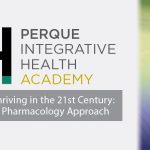The Homeopathy PARQ: Managing Patient Expectations
JARED C. PISTOIA, ND
The PARQ – a form of informed consent for patients – is an important and necessary component of every treatment plan, but especially those that include homeopathic medicines. An acronym that stands for “procedures, alternatives, risks, and questions,” the PARQ ensures that patients thoroughly understand the proposed treatment(s). The homeopathy PARQ can be challenging to communicate to patients, especially when considering that it is not always clear how each patient will respond to their individual remedy. This complexity should not deter physicians from sharing the variable nature of how healing manifests when applying homeopathic medicine. Instead, this relative uncertainty underscores the need for a more comprehensive PARQ when practicing homeopathy.
Aggravations
Although the emerging and complex science of homeopathy makes it difficult to predict patient responses, Frans Vermeulen’s Synoptic Reference 1 is a reliable clinical reference that helps predict the general action of over 500 homeopathic medicines.1 At the beginning of each monograph, Vermeulen lists which organ systems are most affected by the medicine.1 Therefore, it is reasonable to expect that any presenting symptoms associated with those organ systems will be targeted by the medicine. Natrum muriaticum, for example, has an affinity for the nervous and gastrointestinal systems.1 If a patient presents with depressed mood but also experiences occasional constipation, it is reasonable to assume that Natrum muriaticum may temporarily worsen or aggravate either or both symptoms. If you are unsure whether the medicine will have any effect because the case is unclear, assume that it will both act and cause an aggravation. If the given medicine is indicated and the potency is too strong, an aggravation is highly probable, and this should be communicated to the patient as a general, precautionary measure in the PARQ.
Every patient should be made aware that homeopathic medicines can produce an aggravation. I emphasize this point because as wonderful and gentle as homeopathic medicines can be, they can also be aggressive. Aphorism 2 of Hahnemann’s Organon of the Medical Art reminds us that “the highest ideal of cure is rapid, gentle, and permanent restoration of health…in the shortest, most reliable, and most harmless way.”2 Additionally, well-chosen homeopathic medicines, even at seemingly mild potencies, can produce disconcerting aggravations for patients who are unfamiliar with the action of homeopathic medicines. I find that aggravations occur most often with 200C potency medicines in dry pellet form, which is predictably aggressive. But I have also observed a 12C of Gelsemium aggravate heart palpitations.
In a particularly memorable case, a strongly indicated 200C of Lycopodium produced transient hyperacusis and overwhelming anger. The patient originally presented with Lycopodium keynotes and stated: “I want to get this anger out.” The intent of the prescription was to put the patient in touch with his suppressed anger. In that regard, the desired effect was produced, but it overwhelmed him. About 5 days after the first dose, he got into an argument with his brother-in-law and “blew up on him,” which was not his usual behavior. I did hold a PARQ conference with him that expressed the potential for an aggravation, but I should have specifically communicated that his anger may intensify. It always helps to know what to expect, though I’m not sure either of us knew how angry he actually was underneath his calm façade.
Practitioners should keep in mind that patients tend to reach for drugs or additional doses of the homeopathic medicine to try and resolve symptoms of an aggravation. Both actions are obviously undesirable. Communicating the potential for an aggravation presents an opportunity to teach patients how to relieve symptom flare-ups without interfering with the intended action of the medicine. This is also a chance to educate patients about the wide range of naturopathic therapies available to them, and perhaps to send them home with a few additional recommendations. The management of pruritic eczema with a cooling salve for a patient experiencing symptoms of an aggravation after taking Sulfur is a prime example.
Drowsiness & Sleep
By far, the most common reaction I have observed to an indicated homeopathic medicine, especially for overworked patients, is temporary drowsiness. In my observation, drowsiness is a positive predictor for the efficacy of the prescribed medicine, but when it’s not communicated as a possible and beneficial effect, patients can see it as an unwelcome symptom. In doing so, they may miss an opportunity for healing. Patients may also accuse the medicine of producing an unintended consequence when it is simply doing its job. Patients who do allow themselves to fall asleep after taking a well-indicated medicine typically report that their rest was restorative and rejuvenating.
I once treated a patient with brain fog who had a history of sleep deprivation throughout college. He was a driven and ambitious individual who worked at least 12 hours every day, including weekends. Sleep was never a priority for him, and he slept for roughly 5 to 6 hours per night. He said that in college, he routinely slept for only 2 hours every night. I’m not sure how he was able to function on such a limited amount of rest, but his sleep deprivation seemed to catch up with him, manifesting as brain fog and other concerning symptoms. I prescribed a 1M dose of Sulfur. One week later, the patient reported that he had slept for 10 to 12 hours per night over the previous weekend and that he was both surprised and grateful for this result. He further reported overall improvements in sleep quality and duration and noted an increased desire for rest throughout the rest of the week. Over the next month, he stated that he was feeling “clearer than ever,” and that he appreciated that during our PARQ conference, I strongly urged him to rest if he felt like he needed to. If a homeopathic medicine is “encouraging” sleep, then a patient should indeed sleep! The healing potential of rest should never be underestimated, but it may be of particular importance when considering the homeopathy PARQ.
New Symptoms
When the chosen medicine is incorrect, patients may end up proving the medicine. The difference between an aggravation and a proving is simple. An aggravation applies to existing symptoms. A proving creates new symptoms. In clinical context, a proving means that the medicine produced temporary symptoms unrelated to the patient’s presenting concerns. This is an undesirable response for patients and practitioners alike. Patients should be made aware that homeopathic medicines can temporarily create new symptoms, but that these will resolve if the medicine is discontinued. For example, the same patient who experienced palpitations from a 12C dose of Gelsemium also reported new headaches. After discontinuing the remedy, both the aggravation of their heart palpitations and the headaches resolved. Based on the aggravating symptom along with the new symptom of headaches, I determined that Gelsemium was not indicated for that patient and reconsidered my differential for the case.
4 Key Statements for the Homeopathy PARQ
Every PARQ involving homeopathic medicines should include 4 key statements. When communicating these statements, providers should encourage their patients to ask questions. In return, providers should strive to answer them in simple and comprehensible terms. The exchange should be well-documented in the patient’s chart. It may also be prudent to supply patients with a copy of these statements to reference after their visit.
- Any current symptoms may temporarily intensify after taking a homeopathic medicine. This is normal and indicates that the medicine is working.
- Avoid using over-the-counter drugs for symptom flare-ups as this can interfere with the homeopathic remedy’s effectiveness. Always continue to take your necessary prescription medications as instructed. Do not take more of the homeopathic medicine unless otherwise prescribed, doing so may worsen your symptoms.
- You may experience new or unusual symptoms. This indicates that the given medicine may need to be changed. If you notice new or unusual symptoms, please discontinue the medicine and notify me as soon as possible.
- You may suddenly or progressively feel drowsy in the days after taking your prescribed remedy. This is not a “side effect” of the medication; it is a positive sign indicating that the remedy is working, and your body needs rest in order to heal. If you are feeling drowsy, please allow yourself time to sleep. Consider taking time off work (if necessary). Please avoid the use of coffee or other caffeinated beverages that promote wakefulness. These can interfere with your prescribed remedy.
- Vermeulen F. Synoptic Reference I. 2nd ed. Glasgow, Scotland: Saltire Books; 2015.
- Hahnemann S, O’Reilly WB. Organon of Medical Art. Palo Alto, CA: Birdcage Books; 1996.
Jared C. Pistoia, ND, is a naturopathic doctor, professional homeopath, and author of the book In Pursuit of Health. He received his Doctor of Naturopathic Medicine from NUNM in 2020 and is currently practicing telemedicine in the state of Connecticut. You may visit his website at: www.drpistoia.com.









